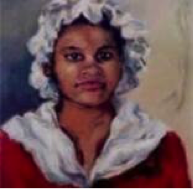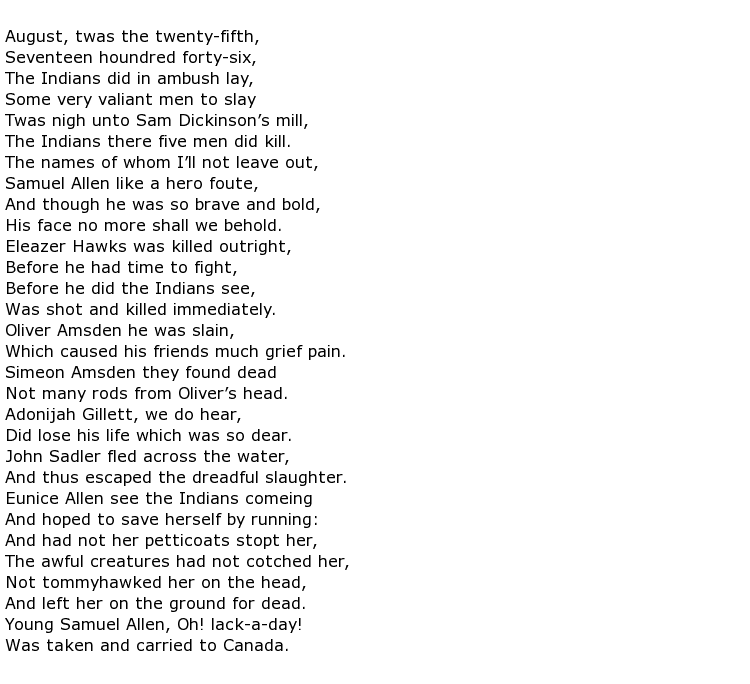 It is generally believed that Lucy Terry Prince was the first black poet in America to have work published. Unfortunately only one of her poems has survived. Bars Fight is a true story about the killing of two white families by Native Americans. As an infant she was plucked from her home somewhere in West Africa and then transported across the ocean. She somehow survived this terrible journey and was sold into slavery in Deerfield, Massachusetts. Here she served the family of Ebenezer Wells until she met and married an affluent, free black man called Abijah Prince. Before this could happen though he had to purchase her freedom. She grew up to be an intelligent woman and was known as a confident and persuasive orator.
It is generally believed that Lucy Terry Prince was the first black poet in America to have work published. Unfortunately only one of her poems has survived. Bars Fight is a true story about the killing of two white families by Native Americans. As an infant she was plucked from her home somewhere in West Africa and then transported across the ocean. She somehow survived this terrible journey and was sold into slavery in Deerfield, Massachusetts. Here she served the family of Ebenezer Wells until she met and married an affluent, free black man called Abijah Prince. Before this could happen though he had to purchase her freedom. She grew up to be an intelligent woman and was known as a confident and persuasive orator.
She was born Lucy Terry sometime around 1730 but there are no details available concerning her early years in Africa. Once settled into the Wells household she was encouraged to attend church and was baptised at the age of five during the Great Awakening years of the early 18th century. Nine years later she was “admitted to the fellowship of the church.” She was well regarded in Deerfield and considered to be the village poet and historian. At the age of 16 she wrote Bars Fight and it was only remembered orally until being published over a hundred years later in 1855. It is believed that Lucy witnessed the killings described. It is a remarkably detailed account of one of many terrible events which took place in the frontier town of Deerfield, in an area known as “The Bars”. This was a common colonial term for a meadow. Here is the poem:

She worked as a slave until 1756 when her freedom was purchased and she was able to marry. They originally lived in a small house in Deerfield and this soon became a magnet for the young people in the village who loved to gather round and listen to Lucy’s stories and poems. She was known as a wise woman with a ready wit and was popular with all her visitors. They did not remain in Deerfield though and Lucy moved with her husband to Guilford, Vermont and it was here that they raised their family of six children.
Life for former slaves was hard of course and they were often threatened by neighbouring white families. During the 1790s she successfully petitioned the Supreme Court of Vermont when their land rights were challenged by one Colonel Eli Bronson. Her reasoned and lucid argument against two learned and forceful lawyers impressed the presiding justice of the Court so much that he stated that

She won her case.
Another example of her skill as an orator was when she went before the board of trustees at Williams College, trying to argue a case for the admission of one of her sons. She was unsuccessful, probably on account of their race, but she engaged the trustees for three hours with her eloquent delivery which cited the scriptures and elements of the law.
Lucy was widowed in 1794 and she moved away to Sunderland which was a good 90-mile horse ride away from her husband’s grave. She visited the graveside annually though right up to her own death in 1821. As a tough pioneer woman such an undertaking would not have posed her any problems but it was, nevertheless, a remarkable act of devotion for an old lady.
There is a story that may, or may not, be true that late in her life she visited her former master in Deerfield and was invited to sit at the family table for supper. She politely refused, saying:

It’s a good story, true or not.
Lucy Prince Terry died in 1821 at the age of 91.

